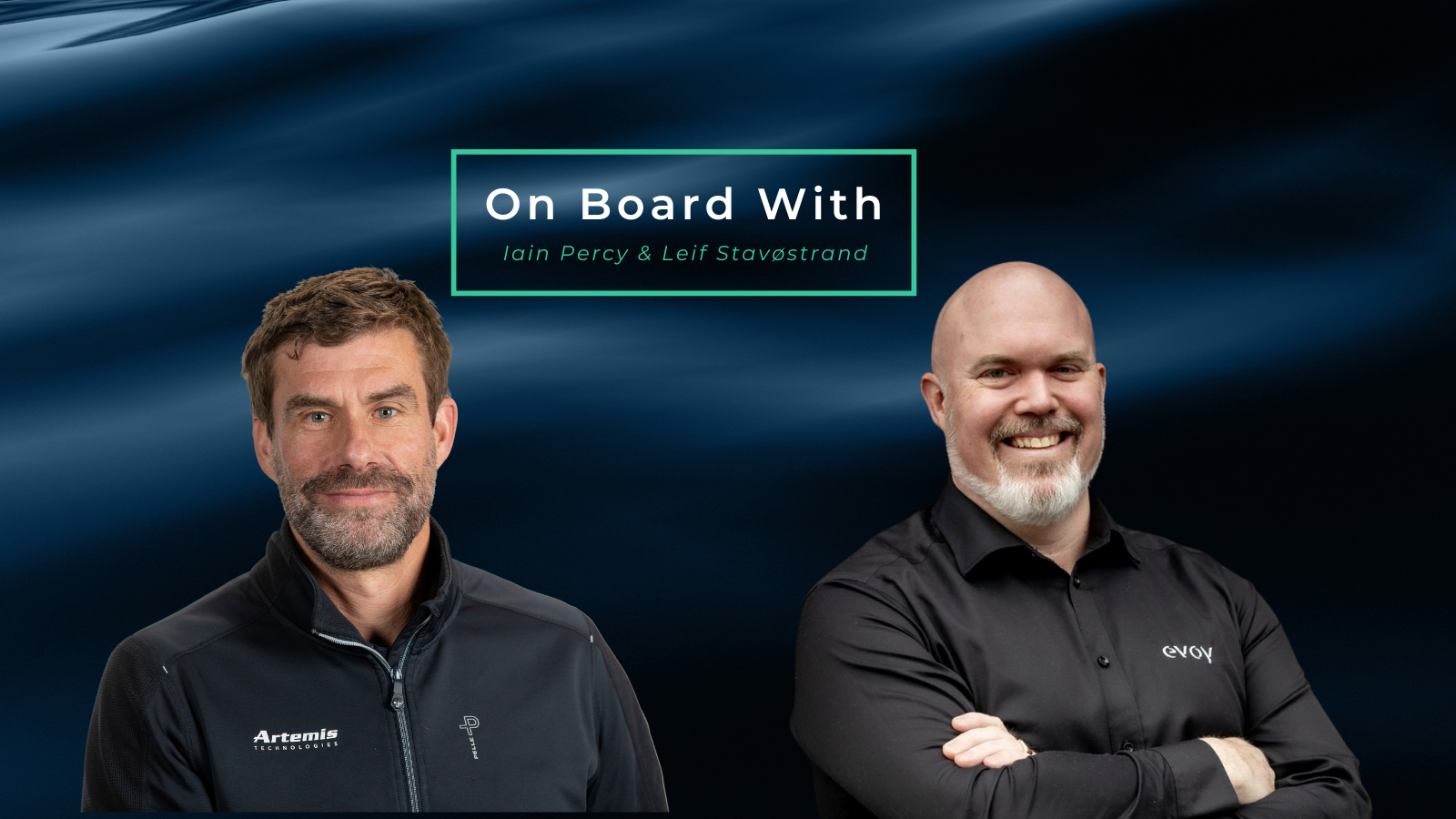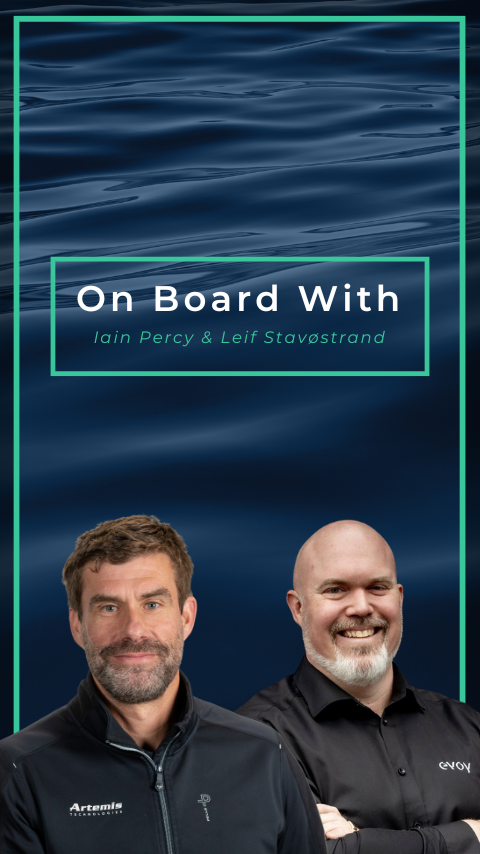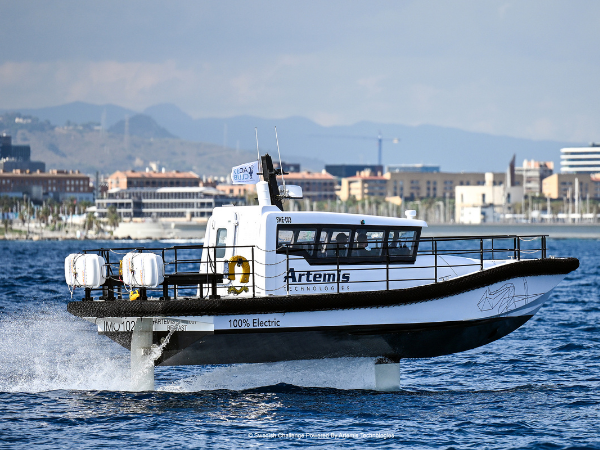



The UK and Norway are North Sea neighbours with strong maritime histories.
Navigating the global maritime industry towards net-zero targets will require many cross-border partnerships and the use of new technologies.
The UK-Norway Memorandum of Understanding on Maritime Cooperation was signed in February 2024 and sets out a commitment to drive forward innovation and cooperation.
Leading the way are Artemis Technologies in Belfast and Evoy, based in Florø, the westernmost coastal town of Norway. These companies are already collaborating and sharing opportunities to deliver sustainable, innovative solutions for customers.
They both have a mission to decarbonise, want to extend the use of electricity to power vessels worldwide, and are led by two visionaries with a wealth of experience and a life-long love of the sea.
Iain Percy is founder and CEO of Artemis Technologies. He was a professional sailor for 25 years and is a three-time Olympic medalist and double Olympic champion.
Travelling the world, Iain witnessed the challenges facing the maritime sector and became passionate about protecting the oceans from pollution. The economics graduate founded Artemis Technologies in 2017 with a mission to decarbonise the maritime industry. Starting out at a base at the University of Cambridge, Iain has overseen the company’s transition from a sailing services provider to an applied technologies company focusing on clean innovations for marine transportation.
At Artemis Technologies, we are using the sea to connect people and we want to decarbonise the maritime sector,
Belfast has been at the forefront of maritime innovation for over a century, and we are proud to be playing our part in continuing that legacy and heralding a new era for maritime.”
Artemis Technologies’ transformative vessels are powered by the patented Artemis eFoiler® electric propulsion system and foil above the waves. They provide significant range at high speed, reduce operational costs and produce zero emissions in operation.
Evoy founder Leif Stavøstrand grew up by the ocean on an island in western Norway and has also always loved boats. Before setting up Evoy, he had a diverse maritime career which included fish farming, the merchant navy and being Sea Captain on a tanker. After sailing around the world for 10 years, he moved to mainly land-based jobs, culminating as CEO of Saga Fjordbase. He keeps boating as a hobby he returns to as often as he can.
Evoy’s electric boat motor systems deliver 120 to 400 continuous horsepower and are in demand across commercial segments such as aquaculture, tourism, ports, and harbours, as well as among recreational boaters. Leif thinks it is inevitable in the long run that boating will go electric.
It is the same with cars. Electric motors are better in every way. They are smaller, they're cheaper, they’ve got more power and, of course, they have no emissions,
Here in Norway, there have been some large surveys done on what boaters appreciate the most by going on the water. One is closeness to nature. They also like being social with friends and family, and wildlife observations. All of these are significantly enhanced by going electric. You have the silence of the boat. You have no fumes. You can get closer to wildlife without interrupting it. It is naturally inherent in electricity that this is the future.
Aligning with the goals of the new memorandum of understanding, Iain Percy and Leif Stavøstrand and their companies are working to drive positive change and shape the future of maritime transport.
Iain said:
Norway has gone further than most countries when it comes to implementing zero emissions vessels on commercial routes. Its fjords and exposed coastline provide the perfect area to benefit from active foil technology.
Our eFoiler technology will open up more routes, faster commuting times and more comfortable transits than previously available in the Norwegian market.
Leif also sees the ocean as providing a natural transport solution for Norway:
Countries like Norway and the UK putting their heads together and saying that they want to lead with decarbonisation and digitalisation within the maritime industry is important.
We want to be an inspiration for others to go electric so the maritime industry can decarbonise as quickly as we can. We owe it to our children and the next generations coming along.

Artemis Technologies was established as a spin-off company from the Artemis America’s Cup sailing team. Its workforce is drawn from across 17 different countries and expertise from aerospace, Formula 1, maritime and automative industries has been key to the success of the company to date.
Following a highly successful sailing career, Iain is now leading a very different race:
Winning for me will be seeing a lot of Artemis Technologies electric foiling vessels around the world making a really significant decarbonisation contribution.
Evoy was established in 2018 and has also attracted global talent. By 2021, it had delivered plug-and-play performance electric motor systems for boats. Leif said:
Eliminating boating emissions is our mission as a company. We also want to make boating irresistible.
Innovation is critical to the maritime industry but being a leader and first mover can be difficult. Leif said:
It’s not just about developing the technology. You also have to convince the market space that this technology is mature enough, it’s safe and that the timing is right to go electric.
It’s important for key players in the industry like us and Artemis Technologies to talk together and find good synergies that we can showcase to the world. We can build trust by working together, opening doors for each other and getting more electric boats on the water.
There’s no one solution to the emissions issue within maritime. There are ocean-going ships transporting goods long distances requiring massive ranges alongside leisure boats that go out for 10 miles. Iain said:
One of the opportunities and advantages of the drive and total necessity to decarbonise maritime is that there will be a degree of standardisation. This brings an ability to drive down costs.
Reducing the drag enormously with foiling has always been the unique selling point of Artemis. We offer a viable range in a safe way.
Our Artemis EF-24 Passenger ferry is designed and built to meet the requirements of the International Maritime Organization's High-Speed Craft Code and the DNV High Speed Light Craft Rules.
Both men understand the value of government support for innovation. In Norway, zero-emission ferries have been operating for years and the country’s wider public transport is increasingly going electric. In 2023, over 80% of new cars sold in Norway were electric. Leif said:
About 10 years ago, the government decided to put out contracts for electrical ferries and have that as a demand in the tenders. It resulted in the first electrical ferry just not far from here in 2015.
Today most of the ferry fleet in Norway along the coast is electric and that’s now spilling into smaller vessels and smaller boats where we are. Government support is crucial to get new industries up and running.
Government funding and support for innovation has also been critical to the success to date of Artemis Technologies and is a validation of the effort and skill of the team and product. Iain explained:
We’re very lucky to have the Belfast Maritime Consortium here which is funded by UK Research and Innovation’s Strength in Places Fund. We partner with some fantastic organisations from the private sector, such as Spirit Aerospace, with their huge experience in large-scale production of composite wings.
In many cities around the world, and famously in the likes of Sydney or New York, ferries are used very much day to day as a commuter service. There will be a real sense of quiet satisfaction that we've done something quite important for society by bringing this incredibly transformative technology to market.
The Artemis Technologies eFoiler® vessels are a really quick and flexible way to decarbonise for cities.
We want to make vessels that are right for our customers around the world and also decarbonise. Collaborating with ambitious, like-minded companies like Evoy will help us both to achieve this goal.
There is great diversity in electric innovations within maritime. Evoy caters to commercial and recreational vessels between 15-50 feet in length. Its electric motors are widely used in sectors like aquaculture, harbour workboats, tourism, and leisure boating.
HM Ambassador to Norway Jan Thompson said:
I met Artemis Technologies when they exhibited at the Nor-Shipping 2023 trade fair in Oslo. One year on I am delighted to hear that they and Evoy are talking together to maximise their opportunities. I look forward to seeing what they can achieve together through collaboration and innovation. This is in the spirit of the MoU on Maritime Cooperation which we were very pleased to agree with Norway in February.